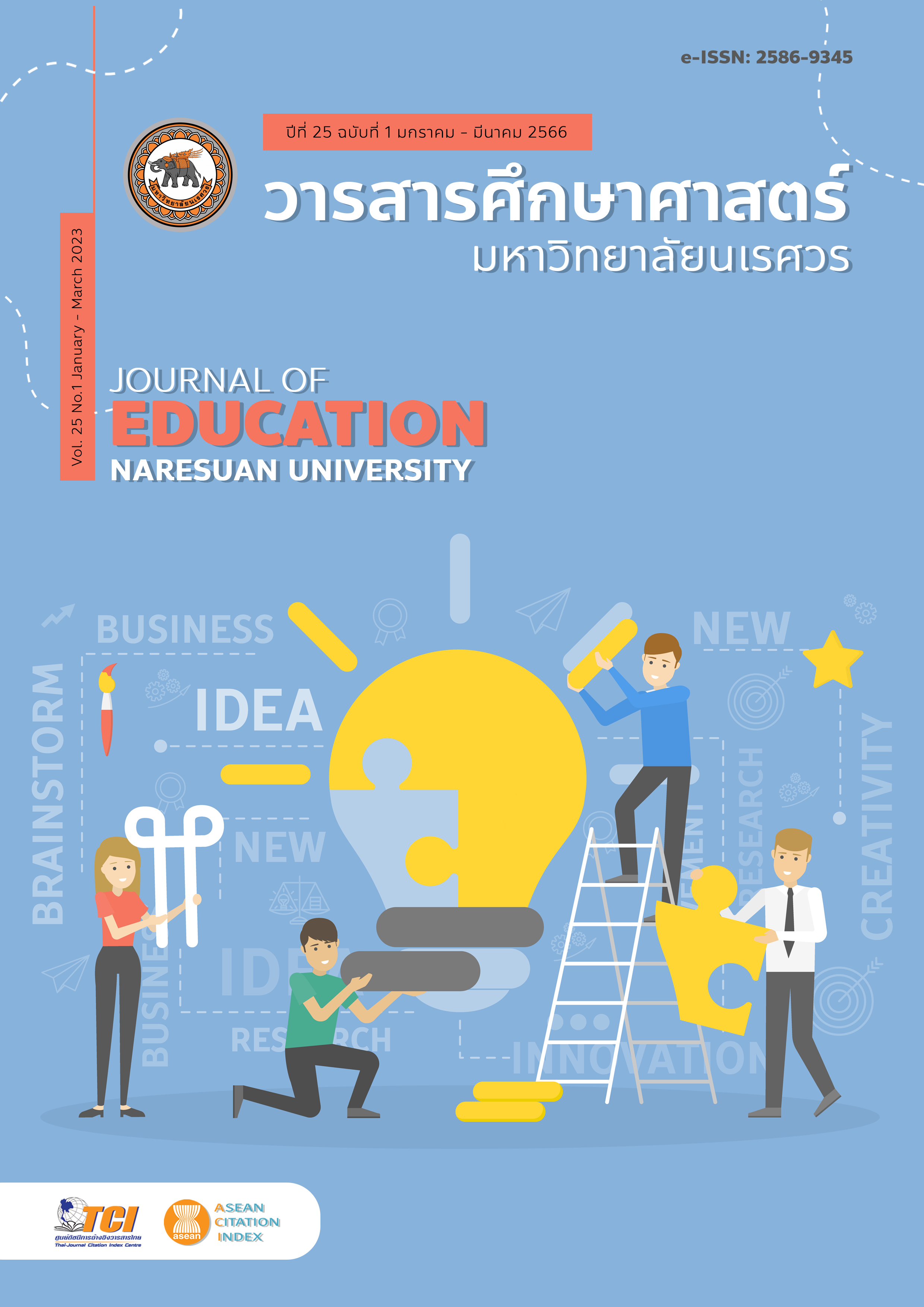EFFECTS OF BLENDED LEARNING INSTRUCTION USING FLIPPED CLASSROOM MODEL ON ENGLISH ORAL ACADEMIC PRESENTATION ABILITY OF UNDERGRADUATE STUDENTS IN WORK INTEGRATED LEARNING PROGRAM
Main Article Content
Abstract
English oral academic presentation is one of the communicative skills required by educational institutions and workplaces. In terms of workplaces, especially international firms, they require both actual employees and apprentices or work-integrated learning students to present information in English on many occasions. However, the Work-integrated Learning (WiL) students have encountered many difficulties, especially when the students have to work as full-time employees in the daytime and study in the evening. This study aimed to investigate the effects of blended-learning instruction using the flipped-classroom model on English oral academic presentation and explore the attitudes after implementation via a mixed research method. The sample consisted of 12 second-year Engineering undergraduate students (transfer program) enrolling in the WiL program at Rajamangala University of Technology Lanna using the purposive sampling method. The instruments comprised pretest and posttest, rubrics, interview questions, and a fortnight block course instructional plan. The results revealed significant increases in verbal skills, = 11.67 and 14.08 out of 28, and non-verbal skills
= 4.41 and 6.08 out of 12 in pretest and posttest protocols, respectively. The qualitative analysis explored positive results that the course helped develop the English oral academic presentation ability.
Article Details

This work is licensed under a Creative Commons Attribution-NonCommercial-NoDerivatives 4.0 International License.
The owner of the article does not copy or violate any of its copyright. If any copyright infringement occurs or prosecution, in any case, the Editorial Board is not involved in all the rights to the owner of the article to be performed.
References
Abdullah, M., Hussin, S., & Ismail, K. (2020). Exploring the effects of flipped classroom model implementation on EFL learners’ self-confidence in English speaking performance. Recent Advances in Intelligent Systems and Smart Applications (pp. 223-241). Springer, Cham.
Alshare, K., & Hindi, N. M. (2004). The importance of presentation skills in the classroom: Students and instructors perspectives. Journal of Computing Sciences in Colleges, 19(4), 6-15.
Bachman, L. F., & Palmer, A. S. (1996). Language testing in practice. Oxford: Oxford University Press.
Brown, H. D. (2004). Language assessment principle and classroom practices. United States of America: Longman.
CEFR. (2020). Qualitative aspects of spoken language use - Table 3 (CEFR 3.3): Common reference levels. Retrieved November 25, 2020, from https://www.coe.int/en/web/common-european-framework-reference-languages/table-3-cefr-3.3-common-reference-levels-qualitative-aspects-of-spoken-language-use
Crosling, G., & Ward, I. (2002). Oral communication: the workplace needs and uses of business graduate employees. English for Specific Purposes, 21(1), 41-57. DOI:10.1016/S0889-4906(00)00031-4
Devito, J. A. (2008). Essentials of human communication (6th ed.). United States of America: Pearson Education.
Graham, C. R. (2006). Blended learning systems: Definition, current trends, and future directions. In Bonk, C. J. & Graham, C. R. (Eds.), The handbook of blended learning: Global perspectives, local designs (pp. 3–21). San Francisco, California: Pfeiffer.
IELTS. (2020). Speaking: Band descriptors (public version). Retrieved November 23, 2020, from https://www.ielts.org/-/media/pdfs/speaking-band-descriptors.ashx?la=en
Köroğlu, Z. Ç., & Çakır, A. (2017). Implementation of flipped instruction in language classrooms: An alternative way to develop speaking skills of pre-service English language teachers. International Journal of Education and Development, 13(2), 42–55.
Long, T., Cummins, J., & Waugh, M. (2017). Use of the flipped classroom instructional model in higher education: instructors’ perspectives. J Comput High Educ, 29, 179–200. https://doi.org/10.1007/s12528-016-9119-8
Mavrodieva, I. (2012). Rhetorical features of academic presentations. Retrieved April 5, 2021, from https://rhetoric.bg/wp-content/uploads/ 2015/04/mavrodieva-i-issue-4-July-2012.pdf
Michigan State University. (n.d.). What, why, and how to implement a flipped classroom model. Retrieved January 14, 2021, from https://omerad.msu.edu/teaching/teaching-strategies/27-teaching/162-what-why-and-how-to-implement-a-flipped-classroom-model.
Pourre, V. (2020). The rise of blended learning. Retrieved April 21, 2021, from https://www.bangkokpost.com/business/2025327/the-rise-of-blended-learning
Quyen, T. T. T., & Loi, N. V. (2018). Flipped model for improving students' English speaking performance. Can Tho University Journal of Science, 54(2), 90. https://doi.org/10.22144/ctu.jen.2018.012
Rajamangala University of Technology Lanna. (2020). Goal. Retrieved April 28, 2020, from https://www.rmutl.ac.th/page/vision?lang=en
Tangjitnusorn, K. (2015). The effects of community-based instruction using hybrid learning on English oral communication for tourism industry of undergraduate students (Doctoral dissertation). Bangkok: Chulalongkorn University.
Tangjitnusorn, K., & Sukavatee, P. (2016). The effects of community-based instruction using hybrid-learning on English oral communication for tourism industry of undergraduate students. Journal of Education Naresuan University, 18(4), 14-28.
Thummanond, C., Visessuvanapoom, P., Suraseth, C., Wintachai, J., Tantixalerm, C., & Tinmala, D. (2020). The effects of using blended learning program on learning engagement of undergraduate students. Journal of Education Naresuan University, 23(2), 140-151.
Wikipedia. (n.d.). Flipped classroom. Retrieved May 6, 2020, from https://en.wikipedia.org/wiki/Flipped_classroom
Xue, R., Wang, L., & Chen, J. (2011). Using the iot to construct ubiquitous learning environment. In Proceedings of the 2nd International Conference on Mechanic Automation and Control Engineering (MACE 2011) (pp. 7878–7880). https://doi.org/10.1109/MACE.2011.5988881
Yeşilçınar, S. (2019). Using the flipped classroom to enhance adult EFL learners' speaking skills. PASAA: Journal of Language Teaching and Learning in Thailand, 58, 206-234.


